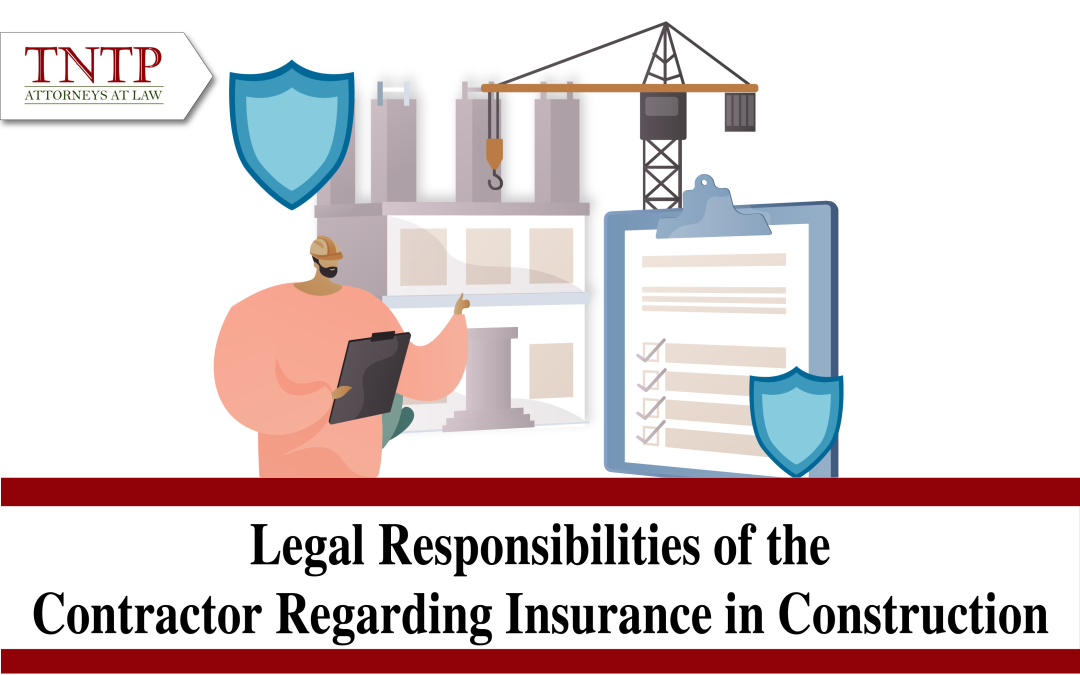Insurance in construction plays a crucial role in mitigating risks and protecting the rights of the parties in a project. Contractors, the entities directly responsible for construction, held significant legal responsibility for obtaining and maintaining the required insurance as mandated by law. These provisions not only ensure financial stability, but also establish a solid legal foundation, minimizing disputes and losses during project execution.
1. Insurance in construction
Insurance in construction is a protective measure aimed at minimizing risks and losses that may arise during the project performance. Construction insurance refers to a contract between the contractor, the project owner, and the insurance company, where the insurance company agrees to compensate for unexpected and unforeseen damages to the construction site, assets, workers, or third parties.
2. Contractor’s responsibility to purchase insurance
• Pursuant to Clause 2, Article 9 of the Construction Law2014, types of insurance in construction investment activities include: (1) Work insurance during the construction; (2) Construction investment consultancy professional liability insurance; (3) Insurance for construction supplies, materials, means, equipment and laborers; (4) Civil liability insurance for third party; (5) Construction work warranty insurance.
• Pursuant to the provisions of Clause 2, Article 9 of the Construction Law 2014, as amended and supplemented by the Amendments Construction Law 2020, regarding insurance in construction activities, construction contractors (including consulting contractors and construction contractors) are required to purchase mandatory insurance as follows:
– Consultancy contractors shall buy construction investment consultancy professional liability insurance for construction survey and construction design of construction works of grade II or higher grade: This type of insurance applies to contractors involved in construction investment consulting, including design, supervision, and other related activities. This insurance ensures compensation for damages caused by errors in consulting or design that affect the progress, quality, or safety of the project.
– Construction contractors shall buy insurance for construction workers working on the construction sites and civil liability insurance for third party.
Insurance for construction workers working on the construction sites: This type of insurance protects the project against risks such as labor accidents, or technical incidents. It helps minimize losses and ensures the rights and interests of both the contractor and the investor.
Civil liability insurance for third party shall compensates third parties for non-contractual damages to health, life, and property that arise directly during the construction process, as well as related legal costs (if any).
• The minimum sum insured for mandatory construction insurance must equal the total value of the project, including materials, labor, equipment, transportation, taxes, fees, and any items provided by the project owner. This value cannot be lower than the total, adjusted or supplemented, construction contract value.
• According to Clause 2, Article 34 of Decree 67/2023/ND-CP, exclusions for mandatory construction insurance during the construction period include: (1) Losses incurred by war, riots, strikes, actions of hostile forces or decision of competent national agencies (2) Losses incurred by terrorism or nuclear and radiation-related events (3) Losses or damages of policyholders and the insured named in the list of entities placed under embargo (4) Losses from legal violations, absence of insurance rights, or halted construction (5) Damage to data or computer software (6) Losses incurred by design faults of consultancies for construction works at class II or higher (7) Losses from corrosion, abrasion, rot, rust, or hard scale buildup (8) Expenses for repair, replacement, correction of defective materials or workmanship (applicable only to directly affected items).
Participating in all required types of insurance not only complies with legal requirements but also demonstrates the contractor’s responsibility toward the project, ensuring timely progress, quality, and safety in construction.
3. Consequences of failing to fulfill insurance obligations
Failure to meet insurance obligations can lead to serious consequences for contractors, including:
• Administrative penalties: Contractors may be fined between VND 50,000,000 and VND 70,000,000 under Article 32 of Decree 16/2022/ND-CP, and required to purchase the necessary insurance.
• Compensation for Damages: In case of incidents, contractors must bear all compensation costs, placing significant financial pressure on them and damaging their reputation.
• Contract Disputes: Contracts between project owners and contractors often stipulate that contractors must purchase construction insurance. Failure to fulfill this obligation may allow the project owner to unilaterally terminate the contract and seek compensation, leading to prolonged disputes.
4. Solutions to implement legal responsibilities regarding insurance
To effectively fulfill legal responsibilities related to insurance, contractors should adopt the following measures:
• Drafting clear and detailed contracts: Contracts should clearly define each party’s responsibilities regarding insurance participation, the required types of insurance, and procedures for handling risks.
• Collaborating with reputable insurers: Selecting a reputable insurance company ensures contractors’ rights and facilitates prompt resolution of incidents.
• Maintaining a strict monitoring system: Contractors should have systems to ensure timely renewal of insurance policies and quick resolution of any incidents.
Fulfilling legal responsibilities for insurance in construction is not only a legal requirement but also an effective tool to protect the interests of contractors and related parties. Adhering to and implementing insurance obligations thoroughly helps contractors minimize financial risks, enhance their reputation, and strengthen their competitiveness in the challenging construction market.
Above is TNTP’s article on “Legal responsibilities of the contractors regarding insurance in construction” that we would like to send to our readers. Hopefully the article is useful for those who are interested in this issue.
Best regards,







